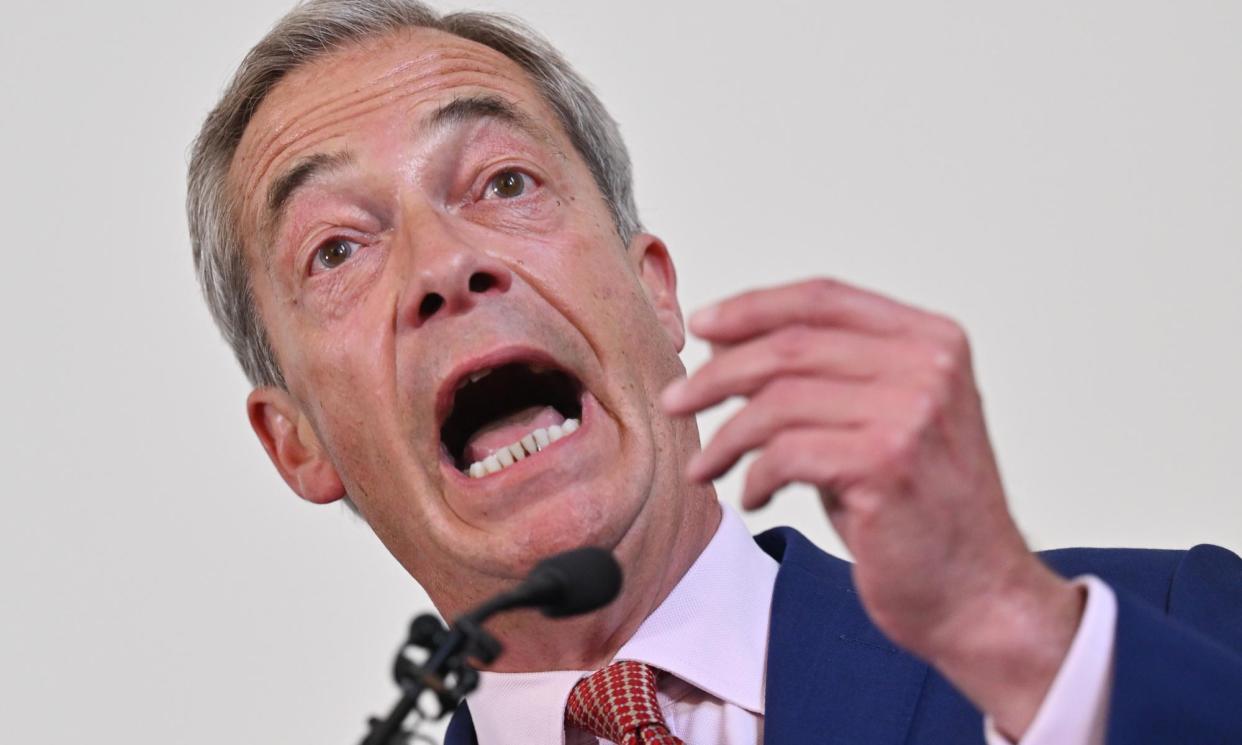‘Playing the ref’: how attacking the BBC became a fixture of UK elections

Nigel Farage knows the BBC will not allow him to join its televised Sunak vs Starmer leaders’ debate later this month. But the he also knows that a battle with the BBC can be an effective political tactic.
“If the BBC want a fight with me on this, they can have one,” Farage has said.
Talk to MPs and political journalists and they are likely to agree: haranguing the BBC over its coverage – also known as “playing the ref” – is a regular part of every election campaign.
The broadcaster’s news output still reaches 80% of Britain’s population every week, giving it an outsized role in the country’s media. And in some cases complaints – or even the fear of a complaint – gets results, with the BBC adjusting details or featuring a rebuttal line more prominently in a story.
When Craig Oliver was running Downing Street communications for David Cameron, the BBC tried to “fob him off” by setting up a dedicated phone number he could call with complaints about the corporation’s news outlet. Oliver’s problem was that when he rang to complain he would find the person with the phone had often either forgotten the device or “was in the shower”.
“I refused to engage with that process,” he said. Instead, Oliver would directly call former colleagues from his previous career as a BBC executive in an attempt to sway how the “vast unresponsive leviathan” of the UK’s national broadcaster was covering a story.
Jonathan Munro, the deputy chief executive of BBC News, said the corporation had “open communication lines with everyone involved in the general election from all parties”. He said the BBC would listen to complaints that a political story had been misinterpreted or a factual error had been made: “Lobbying the BBC is perfectly normal, it’s allowed. But we’re not going to take notice of people lobbying without a factual basis.”
He added: “Anything about the running order of a programme or prominence of a story is a BBC editorial call.”
If back-channels are not successful then a public complaint about the BBC’s coverage can quickly become the story, drawing attention away from the actual policy issue. During the 2019 election, the media coverage became a core part of the story, with Jeremy Corbyn’s Labour criticising the BBC’s political output – and the Conservatives kicking it from the opposite direction.
Rob Burley, a former BBC executive who ran programmes during the 2019 campaign, has written about how Boris Johnson refused to take part in an interview with Andrew Neil. Burley said he was unable to defend himself because “to do so I’d have to expose Downing Street’s dishonest behaviour, which isn’t an option in my position as a BBC manager”.
He said a similar run-in during that summer’s leadership election had given him a taste for how Johnson’s team would deal with BBC dissent. After a bruising on-air Question Time debate left Johnson’s team fuming, Burley said a “wounded” campaign decided to “activate its social media and newspaper assets” to attack the programme.
The overall impact, aided by years of budget cuts and political attacks, can be chilling. Many broadcast journalists at ITV and Sky News say they feel more able to take liberties with election coverage because the risk of political blowback is lower. Without a licence fee to defend or the same accountability processes their bosses are less likely to be hauled in front of select committees.
The relationship between politicians and the BBC has always been complicated, with the national broadcaster often accused of being either too cravenly close to the government of the day or too institutionally bloody-minded to take onboard fair criticism from political parties.
Oliver said this attention showed that the broadcaster still mattered: “The BBC, by a factor of 10, is the most important outlet for any political party trying to communicate.”
He said that even in Downing Street it could feel comparatively lonely to be going up against the BBC. “During an election period the morning bulletins were described to me as the wild west. You’d have output in the morning going to 20-25 million people which would be factually inaccurate. As a political party you feel very strongly that if an institution is at that scale then you need to react and hold them to account.
“Often it’s not the Malcolm Tucker figure shouting – sometimes it’s simply saying, you haven’t heard what we’re saying, can you update that page, change that headline, get that fact correct?”

 Yahoo News
Yahoo News 
